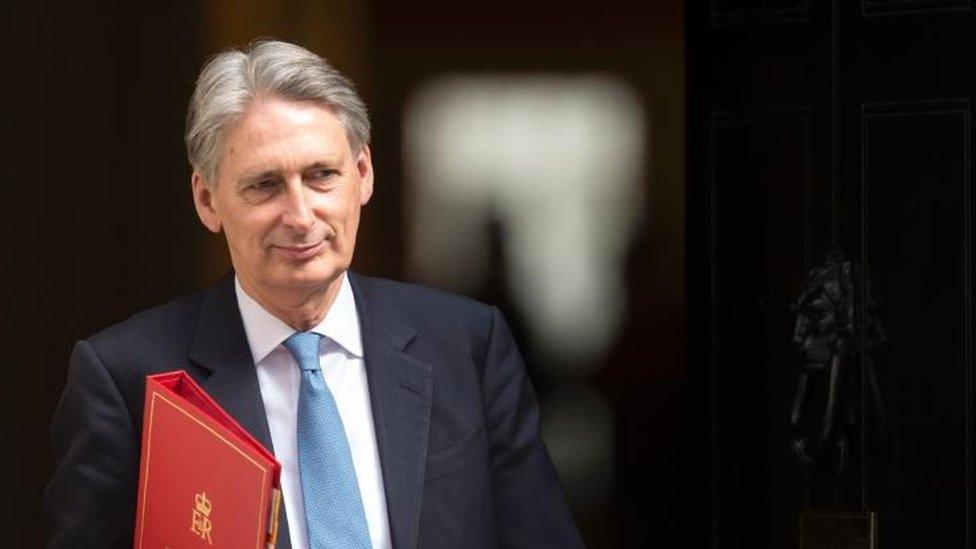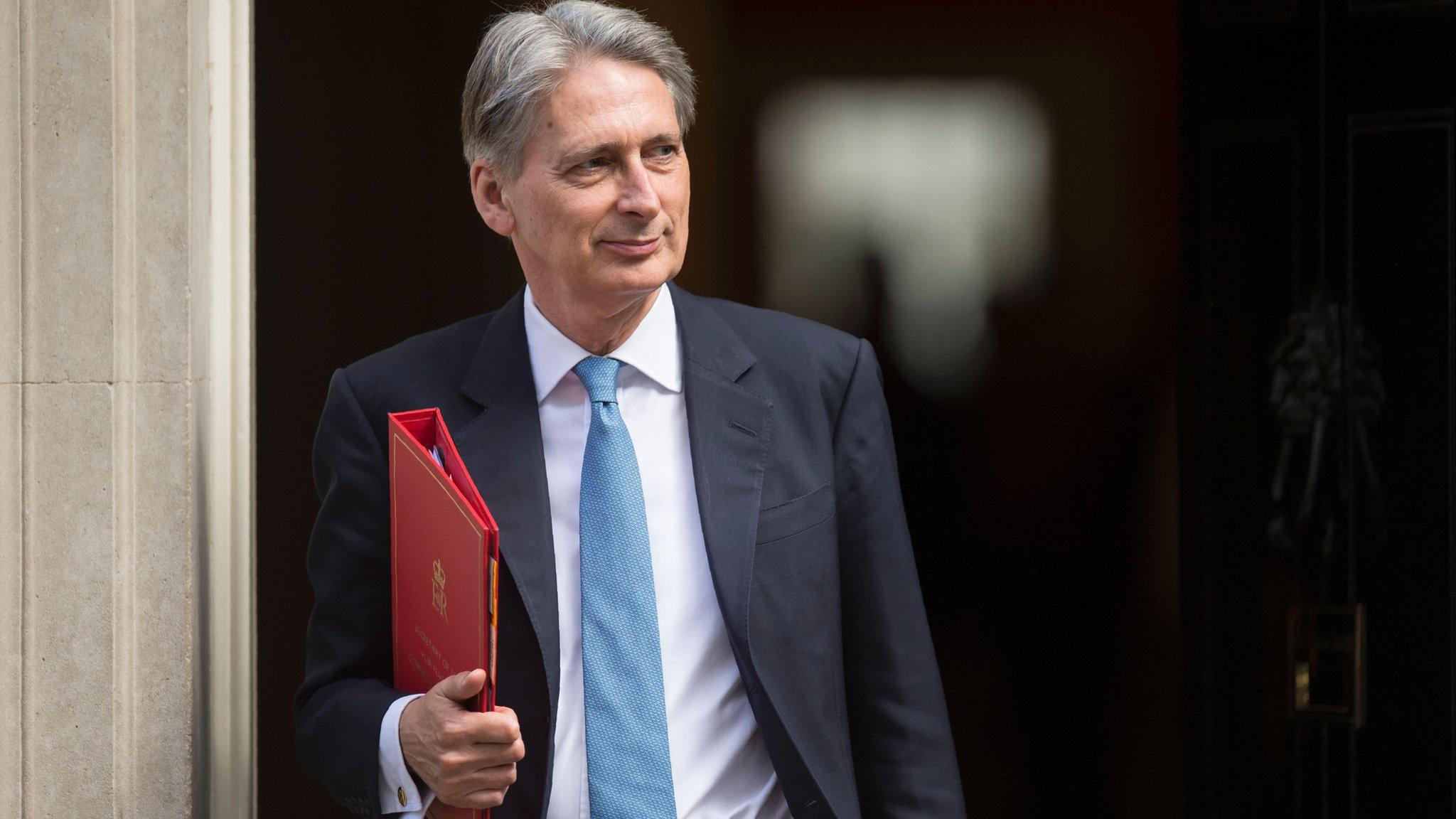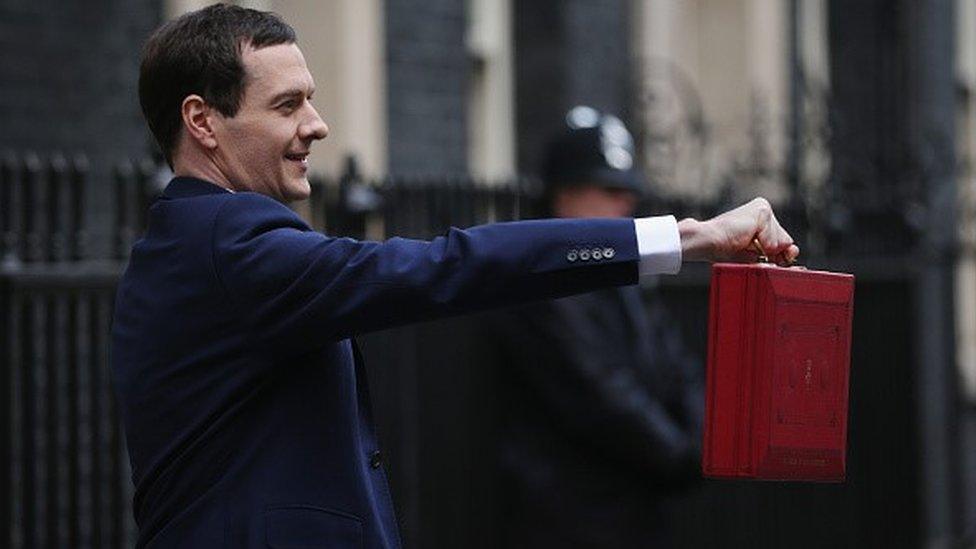Philip Hammond: Financial markets 'rattled' by Leave vote
- Published

The new Chancellor of the Exchequer, Philip Hammond, has said the UK's vote to leave the European Union has "rattled" financial markets.
He added the UK would face "challenges" in managing the economy, because it had suffered a "shock" as a result of the Brexit vote.
He said the decision had caused companies to put plans on hold.
The challenge was to send "signals of reassurance" to kick-start investment and spending decisions, he said.
He added he did not anticipate the need for an emergency Budget as a result of the Brexit vote.
Mr Hammond said the outcome of the referendum had surprised the markets and business.
However, he said the fact that the Conservatives had "moved quickly" to elect a new leader would help to restore confidence.
He said he would be holding meetings today to assess "where the economy is".
Mr Hammond also said he thought Bank of England governor Mark Carney was doing an "excellent job".
'Chilling'
Chancellor Philip Hammond says UK economy is entering a "new phase"
In a BBC interview, it was put to Mr Hammond that he had been an integral part of "Project Fear" ahead of the EU referendum, warning of the economic dangers of leaving.
"There has been a chilling effect," he said.
"We've seen an effect in markets, we've seen business investment decisions being paused because businesses now want to take stock, want to understand how we will take forward our renegotiations with the European Union, what our aspirations are for the future trading relationship between Britain and the European Union.
"But what we've done over the last couple of weeks is move with significant speed to put in place a new government, which can start to deliver that certainty about the future."
'Challenges'
Mr Hammond refused to be drawn on his fiscal plans. He said he would be meeting the governor of the Bank of England, Mark Carney, and other experts and leading players in the economy today "to take stock".
However, he said: "My initial judgement is that the immediate impact on the economy has come from business pausing decisions that they otherwise would have taken, investment decisions.
"And I think the most urgent thing that we need to do is send a signal to business about our intentions, our pragmatic approach to taking this agenda forward now, so that as we leave the European Union, we do so in a way that protects the British economy and ensures that Britain will remain an attractive destination for investments coming here from overseas, maintaining that flow of investment which has been creating the two and a half million jobs that we've created in this country since 2010."
He acknowledged that there would be a challenging job to steer the economy: "It has had a shock as a result of the decision on the 23 June to leave the European Union. That has shaken confidence, it has caused many businesses to pause investment decisions that they were making.
"I think the challenge for us now is to send signals of reassurance about the future as quickly and as powerfully as we can to the international investment community, to British business and British consumers, so that we can get those decisions starting to be made and investment starting to flow into the UK economy again."
'Uncertainty'
He was also asked about the UK's forthcoming negotiations to leave the EU. He has previously said it could take up to six years to ratify an agreement.
Speaking to the BBC, however, he said the important point was not how long it would take to ratify the agreement, but how long it would take to get an agreement on the principle terms of the exit deal.
He said this was necessary to remove uncertainty "so that people in this country and in the European Union, businesses on both sides of the English Channel understand what the trading relationship is going to be between Britain and the European Union, because if there's one thing that is damaging our economy today, right now, it's uncertainty for businesses that want to go ahead investing in new equipment and machinery, building new factories, creating new jobs.
"They want to know on what terms they will be able to sell into the single market of the European Union once Britain is outside that union. "
In the run up to the EU referendum Mr Hammond's predecessor George Osborne said he would have to slash public spending and increase taxes in an emergency Budget to tackle a £30bn "black hole" if the UK voted to leave the European Union.
Following the vote to Leave, Mr Osborne said there was no need for an immediate emergency Budget.
Explaining his decision not to hold an emergency Budget Mr Hammond said: "We will want to work closely with the governor of the Bank of England and others through the summer to prepare for the Autumn Statement, when we will signal and set out the plans for the economy going forward in what are very different circumstances that we now face. and then those plans will be implemented in the Budget in the spring in the usual way."
'Fiscal hawk'
Mr Hammond is one of the Conservatives' most experienced politicians. He told the BBC that the role of chancellor was a "job he had always been interested in".
"I believe it is now going to be incredibly important as we move forward from the historic decision that we have made to leave the European Union and try and build on that decision to stabilise our economy and then go forward to build a new future for Britain," he added.
Before becoming a politician, he had a career in business, in the medical equipment industry.
Mr Hammond studied philosophy, politics and economics at Oxford University and is seen as a "fiscal hawk", which means he believes in prudent public finances.
However, he may be prevented from cutting spending or raising taxes too aggressively by Prime Minister Theresa May.
In a speech launching her bid to become prime minister, she had said "we should no longer seek to reach a budget surplus by the end of the Parliament".
- Published13 July 2016

- Published13 July 2016
- Published14 July 2016
